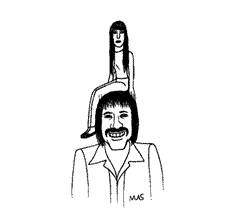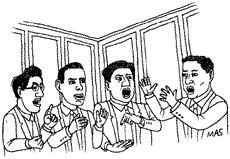
Death
Sonny Bono (1935-1998). After his death in a skiing accident, the pop-singer-turned-congressman is elevated from a "hen-pecked, dim bulb" (Jill Lawrence, USA Today) to "a symbol of the American capacity for reinvention" (Newsweek). Many critics conclude that Bono was not as buffoonish as his public image, which they claim he self-consciously cultivated to advance his career. They judge him an underappreciated songwriter and say his lasting legacy will be The Sonny & Cher Comedy Hour, "one of the first to slickly package the counterculture for mass consumption" (Albert Kim, Entertainment Weekly).
Books
A Prayer for the City, by Buzz Bissinger (Random House). Raves for a Pulitzer Prize-winning journalist's account of Philadelphia Mayor Ed Rendell's battle against the city's decrepitude. In the New York Times Book Review, Robert Fishman compares Bissinger's book to "such classics of urban reportage and analysis as J. Anthony Lukas's Common Ground." Reviewers especially like its scope: Bissinger interweaves the stories of a shipyard worker and a poor black grandmother with political history. The Wall Street Journal's Fred Siegel, among others, praises Bissinger for showing both Rendell's courage (he took on unions) and the limits of his old-school liberalism. (Random House plugs the book.)
Cold Mountain, by Charles Frazier (Atlantic Monthly Press). The debate over the National Book Award-winning Civil War novel, which has sold about 1 million copies so far, escalates. Several recent reviews buck the critical consensus and deride the book, the story of a Confederate deserter, for being too self-consciously novelistic (James Gardner, National Review). Like "a literary approximation of an already literary idea of reality," says Slate's James Wood. The Weekly Standard's J. Bottum rebuts that Cold Mountain's highbrow critics misunderstand its middlebrow virtues. It is "a perfectly enjoyable piece of sentimental fiction, straight from those golden days of the 1950s." (Click here for an excerpt.)
The World According to Peter Drucker, by Jack Beatty (The Free Press). Critics anoint the Vienna-born management theorist Peter Drucker a great intellectual. "Alone among the guru class, he grabbed hold of business and made it do and say extraordinary things" (Michael Lewis, the New York Times Book Review). They emphasize Drucker's philosophical influences (he studied Kierkegaard and political theory), his vast oeuvre, and his long-standing doubts about free markets. Beatty wins praise for his clear explications of Drucker's writings but is chided for "reducing what may have been scintillating intellectual biography to ... a layman's guide" (Adrian Wooldridge, the Wall Street Journal).
Movies
Afterglow (Sony Pictures Classics). Critics wax effusive about Julie Christie's performance in Alan Rudolph's romantic drama. Christie's character (a former horror-movie star) and her husband (Nick Nolte), their marriage damaged by grief over their runaway daughter, pursue extramarital affairs and unwittingly swap partners with a younger yuppie couple. Christie "renders such a captivating performance that she alone justifies the price of admission," says Variety's Leonard Klady. Most critics fault the film on other counts, particularly its languid pacing, stock characters (Nolte plays a seductive handyman), and melodramatic dialogue. It "descends into a silly season" (Janet Maslin, the New York Times). (The studio trumpets the movie here.)

Arguing the World (First Run Films). A documentary about four famed New York intellectuals (Irving Howe, Nathan Glazer, Irving Kristol, and Daniel Bell) occasions outpourings of nostalgia for the "vanished intellectual era" of their youth (David Margolick, the New York Times). The film wins praise for charting the tumultuous friendships among these popular social critics, as well as the evolution of all but Howe from '30s radicals to '60s neoconservatives. Documentarian Joseph Dorman is credited with producing "one of the deepest portraits ever filmed of the fluidity of ideas" (Stephen Holden, the New York Times).
Ma Vie en Rose (Sony Pictures Classics). Critics applaud rookie Belgian director Alan Berliner's film, about a 7-year-old boy who yearns to be a girl, for giving "an inside report ... from the enchanted, irradiated island of childhood" (Richard Corliss, Time). Critics appreciate its avoidance of hackneyed gender politics, and its presentation of the boy's colorful, cartoonlike fantasies. Praise goes to Georges Du Fresne, the child actor "who seems, in some prodigious way, to understand" his character (Stanley Kauffmann, the New Republic). Dissenting, the Wall Street Journal's Joe Morgenstern says the movie is cloying, "cheerful nonsense" and that its creators don't realize that "this kid is profoundly troubled." (Stills and clips are available here.)
Updates
In the New York Times, Maureen Dowd savages Woody Allen's Deconstructing Harry: "This movie is not art. It is a clinical document, an anthology of unexamined prejudices, a tiresome Manhattan whine." ... Toni Morrison's Paradise continues to divide critics. Time puts the novelist on its cover and raves, "To read the novel is ... to confront questions as old as human civilization itself." In Slate, Brent Staples finds that the novel's "absence of workaday and historical detail keeps the reader at a distance; many of Morrison's characters are impenetrable to the mind's eye." ... The New Republic's Jed Perl bashes the newly opened J. Paul Getty Museum, designed by Richard Meier, whose architecture, says Perl, "only works in coffee-table books. ... What Meier's work lacks is heat, an organic flow."
Recent "Summary Judgment" columns
Movie--The Apostle;
Movie--Oscar and Lucinda;
Movie--The Boxer;
Television--Seinfeld (NBC);
Book--Truman Capote: In Which Various Friends, Enemies, Acquaintances, and Detractors Recall His Turbulent Career, by George Plimpton;
Book--Paradise, by Toni Morrison;
Music--"Northern Lights: The Music of Jean Sibelius."
Winter Movie Roundup
"The Year in Review in Review"
Movie--Titanic;
Movie--Deconstructing Harry;
Movie--Scream 2;
Television--Ally McBeal (Fox);
Art--"Gianni Versace" (Metropolitan Museum of Art);
Architecture--Museum of Modern Art (New York City);
Book--Hogarth: A Life and a World, by Jenny Uglow.
--Franklin Foer
